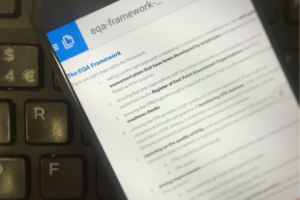
Levelling the playing field for students and taxpayers
Almost half of people under 30 now go into higher education and, for many, they do this by taking GCSEs, A Levels and then on to university. However, for some people, this route isn’t practical – perhaps they didn’t get the grades they needed, or were ill during their studies and couldn’t take exams, or maybe they came to the UK from abroad and don’t have the right qualifications to go to university.
That’s where Access to Higher Education (HE) courses come in.
Access to HE courses (or Access courses as they are often called) are for people aged 19 or over, who wish to return to education to prepare for studying for a degree course. As well as being a valuable alternative route to university, learners can also apply for an Advanced Learning Loan to cover the cost of an Access courses, and, even better, Student Finance England will ‘write off’ any Advanced Learner Loan balances you owe for an Access course once you complete a relevant Higher Education course – this means you don’t have to repay it!
But these courses face unfair competition from universities who offer a rival but often more expensive type of course. In this blog, first published in Tes magazine, Tulay Rashid Grant (our curriculum director for HE, access to HE and adult vocational learning), explains more about the value of Access courses and the threat from universities.
Aaah summer. School and college have finished for another year, exams are done and dusted, and for many of us, the long summer break means some well-earned time off work. Thoughts turn to holidays and all that that entails, from what books to take to the beach, to what on earth to do with the kids for the next six weeks. It also marks the graduation celebrations season, where up and down the country, graduates have been donning robes and mortar boards to celebrate the end of their studies and (hopefully) the start of their careers.
As an FE college, you may think that WestKing would have little to do with graduations, but you’d be wrong. We are one of London’s largest providers of one-year Access to Higher Education Diploma courses – in subjects from Engineering to Midwifery to Business. These provide a valuable route into a fully-fledged degree course for hundreds of people of all ages every year. They help students develop key study skills, as well as including vocational modules that give them the grounding they need to cope well at the next levels. Access to HE Diplomas are widely accepted by universities and are equivalent to full level 3 qualifications that have UCAS tariff points. Indeed our courses serve Londoners from all boroughs, and our students are accepted to study at a broad range of universities across the UK, including those from the Russell Group.
Recently, we held our annual graduation celebration for our Access students. As the college’s Curriculum Director for Adult learning, I have met many of those who graduated this year and have been struck by the different paths that brought them to the college. For example, one student had been seriously ill when she was supposed to be taking her A Levels and had to drop-out of school, while another had come to the UK later in life and found that their educational qualifications from their home country weren’t sufficient to get them onto a degree course here. There are other tales I could tell, but the thread linking almost all of them is that the ‘traditional’ GCSEs-then-A Levels route into Higher Education was not open to them and an Access course was their only viable option.
By enabling more people to access a university degree course, Access courses run by FE colleges are therefore a vital piece in the educational jigsaw and have helped thousands of people from disadvantaged backgrounds to improve their social mobility. However, as the recent Augar Review highlights, they are under threat. Colleges are facing serious, and arguably unfair, competition from the better-funded university sector, which offers one-year “Foundation years” courses. These one-year courses typically cost the same as each year of a full degree – universities can charge up to the maximum tuition fee of £9,250.
By contrast, a college-run Access to HE course costs just £3,500 per year (learners can also take out an Advanced Learner Loan to cover the cost, which is wiped when they have completed their Foundation Degree). However, having benefited for years from being able to charge over £9,000 per student per year, universities have the financial muscle to out-compete FE colleges for these students… to the student’s financial detriment.
We have close and excellent relationships with many universities, including Middlesex University, London South Bank University and others, where staff and students from these universities visit the college to speak to our learners and support them with their transitioning to Higher Education. We consider ourselves partners of the university sector, but would love to see more Access students learning in FE’s supportive environment. As a result, we welcome the Augar Review’s recommendation, to withdraw student finance for the foundation years attached to degree courses, as this would level the playing field between FE and universities, as well as providing better value for money for students and taxpayers alike.
We would welcome the opportunity to work in partnership with universities to deliver Access to HE Diplomas, to even better prepare students for university. In working closely with universities we can ensure that we are preparing learners for their higher level programmes.
As another academic year ends and students and staff head-off for their summer breaks, let’s see if we can work together to enable even more people to achieve their dream of an affordable degree.



